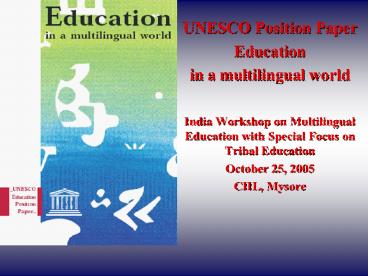UNESCO Position Paper PowerPoint PPT Presentation
1 / 17
Title: UNESCO Position Paper
1
- UNESCO Position Paper
- Education
- in a multilingual world
- India Workshop on Multilingual Education with
Special Focus on Tribal Education - October 25, 2005
- CIIL, Mysore
2
Introduction Living in a World Where...
- All children have access to quality primary
education - 50 percentage increase in literacy
- by 2015
3
Introduction Language Dynamics
- Political transformations and new language
policies - Disappearance of hundreds of languages
- Mass migratory movements
- Internet
- Globalization
4
Challenges for education systems
- Linguistic diversity and multilingualism
- 6-7000 Languages in the world today
- Wide Range Iceland 1, Papua New Guinea 800
- 70 of world languages found in 20 nation states
- Yet, bilingualism and multilingualism are the
norm rather than the exception - From traditional diversity to diversity brought
about by migration - Need to understand impact of school versus home
languages on children
5
Challenges for education systems
- Minority and majority languages
- National borders/contexts define majority
languages - e.g. Mandarin is majority language in China,
minority language elsewhere - Minority is ambiguous and context dependent
- Social, political as well as numerical dimensions
6
Challenges for education systems
- Official languages
- Most countries have only one official language
- Official languages used for legal/government
- Yet, most are still multilingual
- National languages
- Some countries recognize national languages
- Symbolic Status and visibility
- Conceptual Shared values and worldview
7
Challenges for education systems
- Languages of Instruction Teaching the basic
curriculum of the educational system - Choice of language or languages of instruction
- Usually, pressures to use only one (more later)
- Mother tongue speakers can be at a disadvantage
similar to foreign language learners
8
Challenges for education systems
- Mother Tongue Instruction How to Define?
- Language one has learned first?
- The language one knows best or uses most?
- Spoken variation or more formal school version?
9
Challenges for education systems
- Challenges to Students
- To learn both a new language and the knowledge
that it contains - Extra difficulties for Illiterates, Minorities,
Refugees - Gender Women more likely to be monolingual
10
Challenges for education systems
- Mother Tongue Instruction Challenges to
Educators - Unwritten language
- Unrecognized as a legitimate language
- Lack of appropriate educational terminology
- Lack of educational materials
- Multiplicity of languages in school
- Lack of trained teachers
- Resistance by students, parents, teachers
11
Challenges for education systems
- Linguistic rights
- Claims for languages often coincide with
political change - International Agreements state
- Schooling in their languages, if so desired
- Access to the language of the larger community
and to that of national education systems - Promotion of positive attitudes with regard to
minority languages - Access to international languages.
12
Challenges for education systems
- Language teaching
- Language as a specific part of curriculum
- Access to new value systems, world views
- Bilingual and multilingual education
- Culturally and linguistically distinct
communities can only be addressed by multilingual
education - Additive approach to multilingual education is
key Dont teach another language as a
replacement (subtractive approach)
13
Normative framework
- United Nations standard-setting instruments
- UNESCO Declaration and Convention
- Outcomes from international conferences
14
UNESCO guidelines
- Principle I
UNESCO supports mother tongue instruction as a
means of improving educational quality by
building upon the knowledge and experience of the
learners and teachers.
15
UNESCO guidelines
- Principle II
UNESCO supports bilingual and/or multilingual
education at all levels of education as a means
of promoting both social and gender equality and
as a key element of linguistically diverse
societies.
16
UNESCO guidelines
- Principle III
UNESCO supports language as an essential
component of inter-cultural education in order to
encourage understanding between different
population groups and ensure respect for
fundamental rights.
17
Conclusions
- A careful balance needs to be made between local
languages and access to global languages - There is a need for a clear statement for
language policy in relation to education,
particularly within the context of Education for
All

